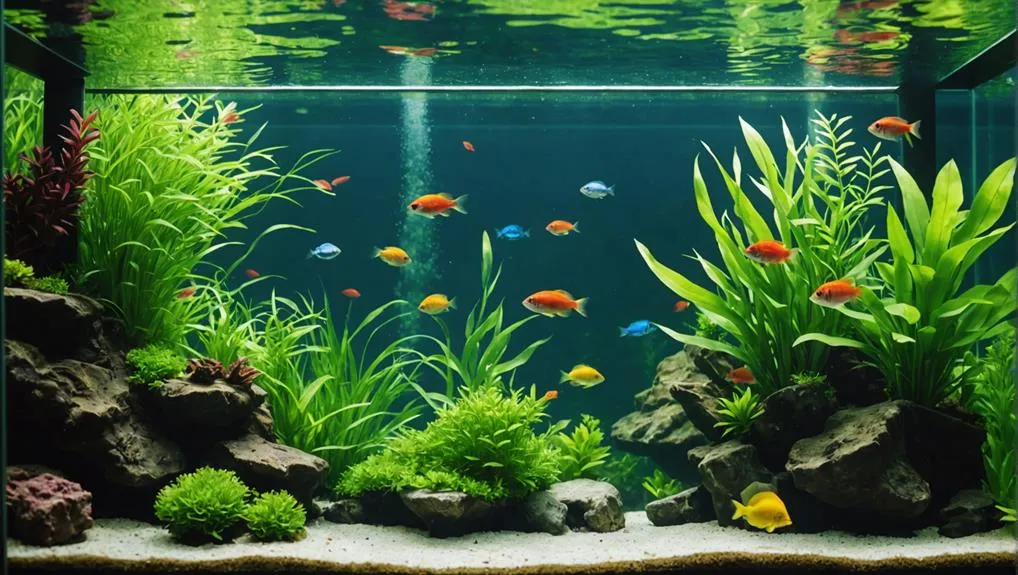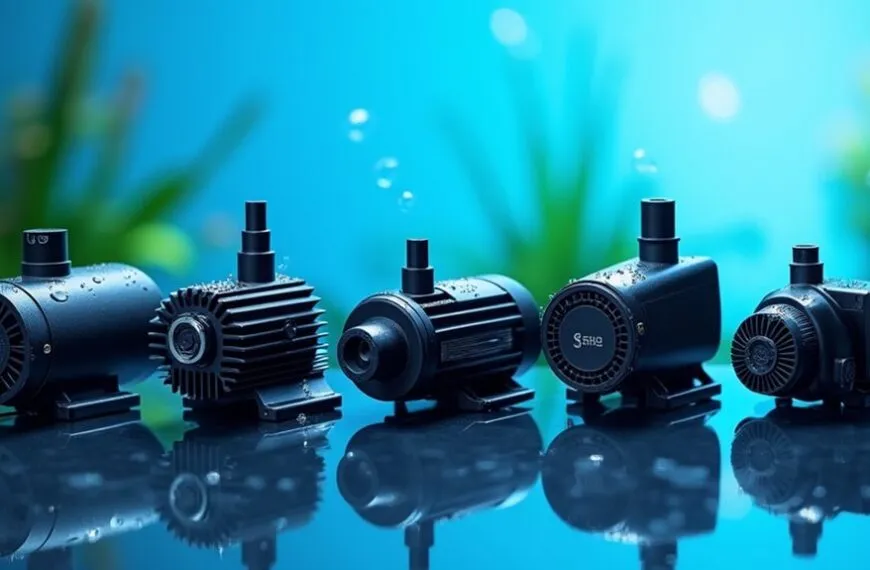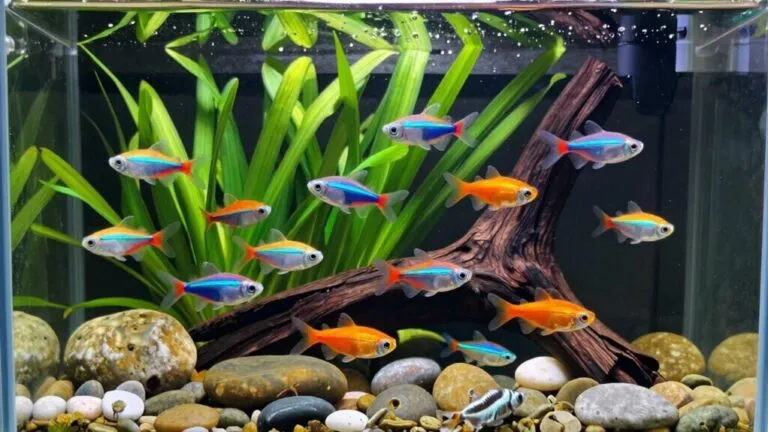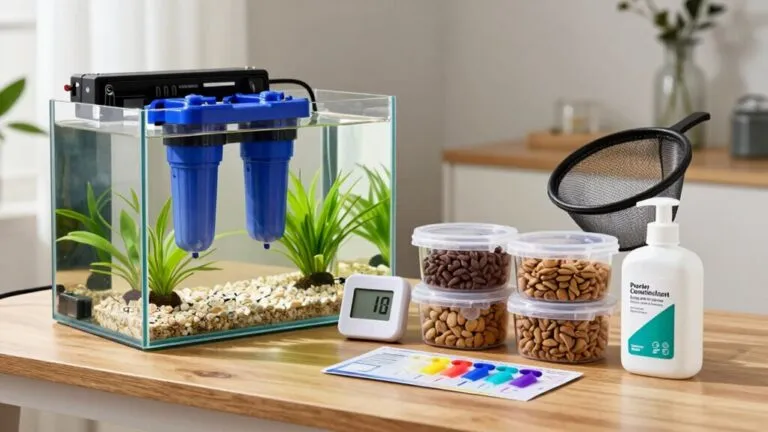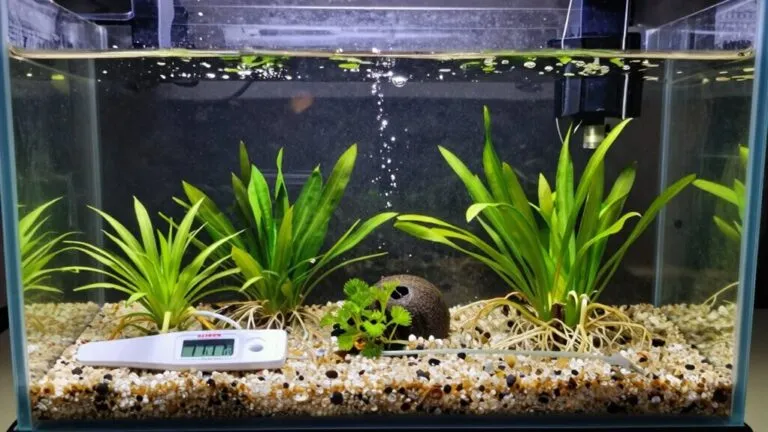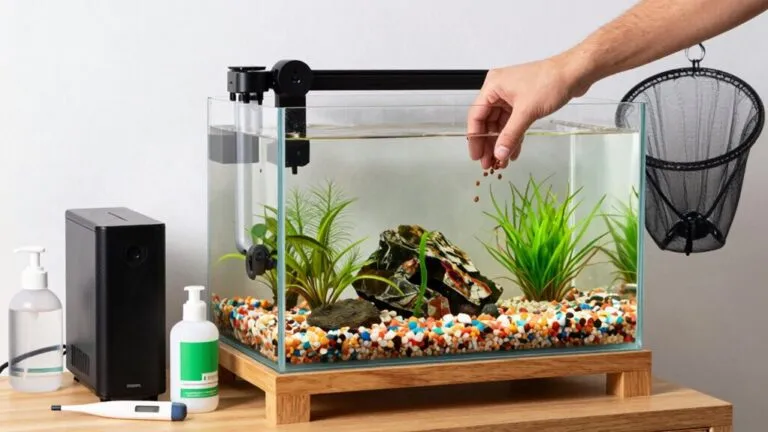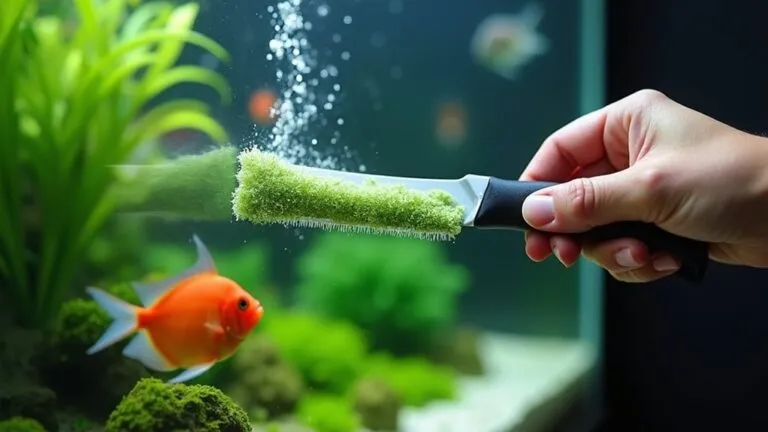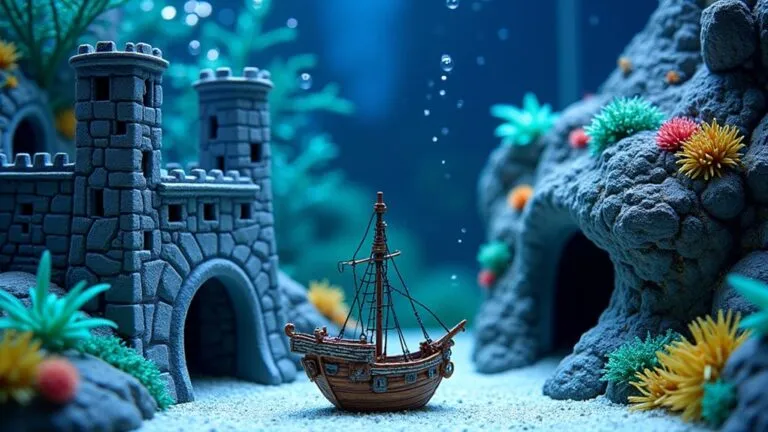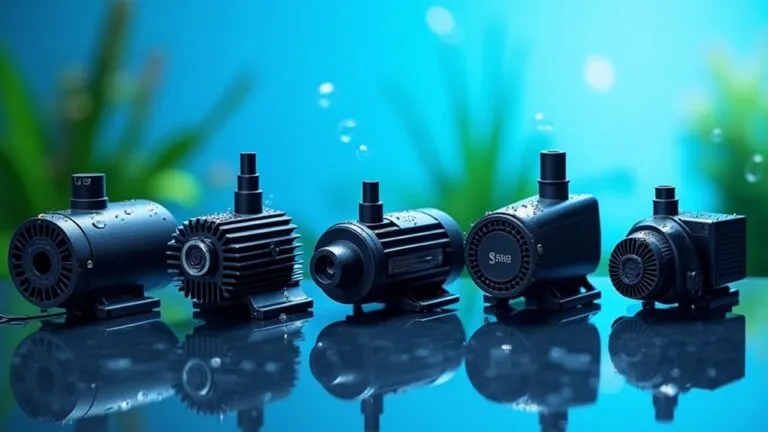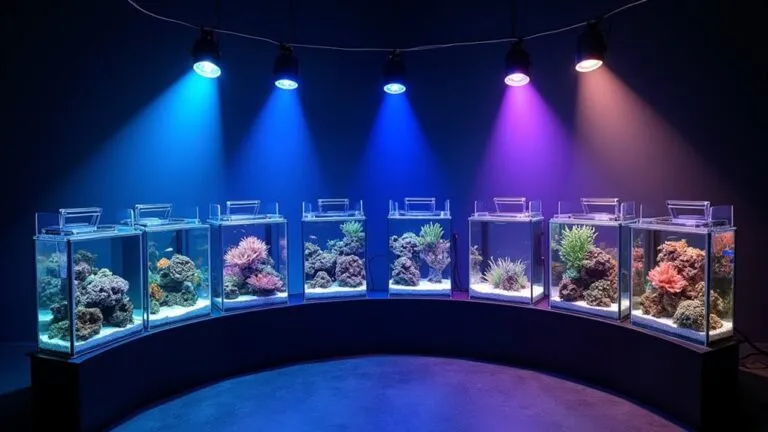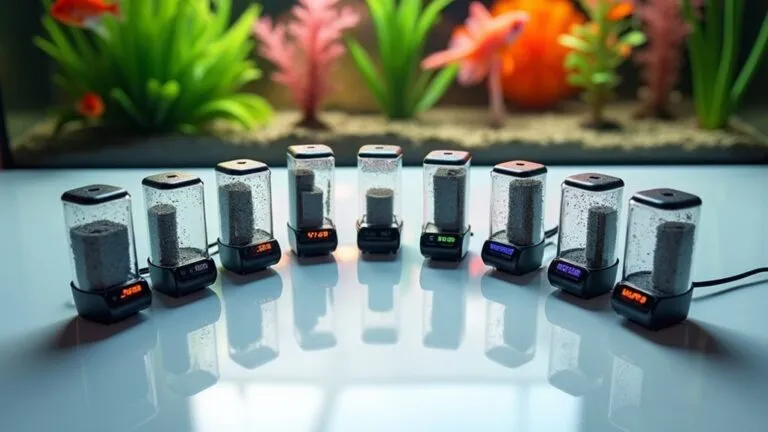When it comes to filtration systems for your freshwater tank, you've got some great options. The AquaClear Filter is a top favorite, offering reliability and customization for tanks of various sizes. If you're on a budget, check out the MarineLand Power Filter—it's both affordable and effective! For larger tanks, Fluval Performance Canister Filter does an excellent job. Remember, a solid filter works hard to keep toxins at bay while promoting a healthy environment for your fish. With regular maintenance and the right media, you'll help your aquatic pals live their best lives. Let's explore how to choose the perfect setup!
Contents
Importance of Filtration Systems
Filtration systems are absolutely vital for keeping your freshwater tank healthy and thriving. Think about it: these systems ensure your aquatic friends have a safe place to live by removing harmful toxins like ammonia and nitrate.
Regular testing and maintenance of water quality parameters are essential to ensure the filtration system is functioning optimally, as essential test parameters help identify any issues that may arise. Without proper filtration, waste and debris can pile up, causing poor water conditions that stress your fish. And trust me, no one wants a stressed fish!
Filtration uses beneficial bacteria that break down waste, turning your tank into a mini-ecosystem.
There are three main types of filtration—mechanical, biological, and chemical—each playing a unique role. They work together to provide clean water, like a well-orchestrated symphony for your fish.
Moreover, effective filtration enhances oxygen circulation, which is crucial for your aquatic pals' survival.
Keeping those filters running continuously is key to promoting a healthy ecosystem and preventing pesky conditions that lead to bacterial growth and algae blooms.
Overview of Filter Types
When it comes to keeping your freshwater tank healthy, understanding the different types of filtration methods is key.
You'll want to consider mechanical filtration for debris, biological filtration to boost beneficial bacteria, and chemical options to tackle unwanted toxins.
Each type plays a unique role, and finding the right balance will keep your aquatic friends swimming happily!
Mechanical Filtration Methods
In freshwater tanks, mechanical filtration methods play a crucial role in maintaining water clarity and quality by effectively removing solid debris and particulate matter.
You'll find various filter types that cater to different needs and tank sizes, making it easier to create a healthy environment for your aquatic friends.
Hang-on-back (HOB) filters are perfect for beginners. They're easy to install and maintain, ensuring your tank stays clean without taking up much space.
If you have a larger aquarium, consider canister filters. They offer powerful mechanical filtration and can handle multiple stages of debris removal, plus you can customize the media for even better performance.
For those breeding fish or wanting a gentle setup, sponge filters work wonders. They use an air pump to draw water through sponge material, capturing debris while supporting beneficial bacteria growth.
And don't forget about under-gravel filters, which filter water as it passes through gravel, although they need a bit of management to prevent clogging.
With these options, you'll be well-equipped to keep your freshwater tank sparkling and your fish happy!
Biological Filtration Importance
Biological filtration is vital for maintaining a healthy freshwater tank, as it relies on beneficial bacteria to break down harmful ammonia and nitrites produced by fish waste and leftover food.
Think of these bacteria as the unsung heroes of your aquarium, working tirelessly behind the scenes to keep your fish happy and thriving.
Different filter types can enhance your biological filtration efforts. Canister filters, for instance, typically offer a larger surface area for beneficial bacteria to colonize, making them a great choice for bigger tanks.
On the other hand, hang-on-back filters can also do the job, though they mightn't provide as much space for those helpful microbes.
It's important to remember that the effectiveness of biological filtration can depend on various factors like tank size, water temperature, and even how much organic matter you have.
To keep your beneficial bacteria flourishing, don't forget to regularly maintain your filter media.
Just be careful during cleaning—too much scrubbing can accidentally wipe out your bacterial buddies!
With a solid biological filtration system, you'll see improved fish health and a balanced aquarium ecosystem, making your aquatic adventures all the more rewarding.
Chemical Filtration Options
Many aquarium enthusiasts find that incorporating chemical filtration into their setup can significantly enhance water quality.
Chemical filtration works wonders by using activated carbon and resin media to remove dissolved impurities, odors, and toxins from your aquarium water. This means your fish can thrive in a cleaner, clearer environment!
When it comes to choosing the right filter, canister filters are a fantastic option. They often include designated stages for chemical filtration, letting you customize the media based on specific contaminants that might be lurking in your freshwater tank.
Hang-on-back (HOB) filters are also a popular choice. They're super versatile, allowing you to easily replace chemical media, which helps improve water clarity without too much hassle.
Don't forget about fluidized bed filters! They use a moving bed of media, maximizing contact time with the water to ensure even more impurities are removed.
Remember, regular monitoring and replacing of your chemical filter media are key to keeping the water clean and your aquatic friends happy.
Best Filters for Freshwater Tanks
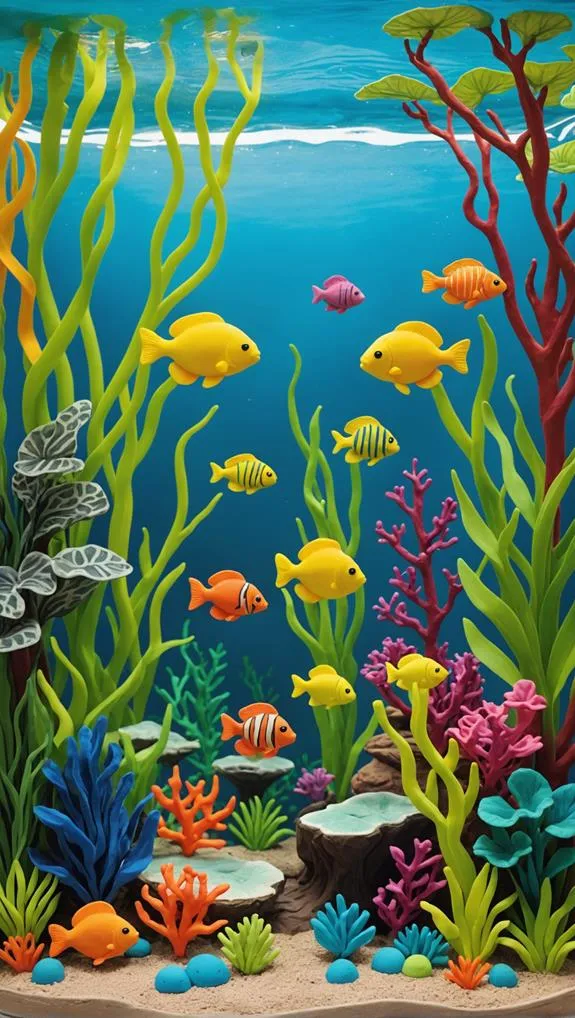
Now that you've got a handle on the different filter types, let's talk about the best filters for your freshwater tank.
Whether you're looking to splurge a little or save some bucks, there's a perfect option waiting for you.
From budget-friendly picks to powerhouse filters for larger tanks, you'll find just what you need to keep your aquatic friends happy and healthy!
Filter Types Overview
When setting up a freshwater tank, choosing the right filter is crucial for maintaining a healthy environment for your fish. With so many types of aquarium filters available, it's essential to understand which one fits your needs best.
Here's a quick filter types overview to help you decide:
- Hang-On Back (HOB) Filters: These are popular for their ease of installation and maintenance, perfect for tanks up to 75 gallons. They allow customization with different media.
- Canister Filters: Ideal for larger tanks (250-400 gallons), canister filters like the Fluval Performance Canister Filter offer powerful filtration and versatility for enhanced water quality.
- Sponge Filters: Perfect for breeding or small tanks (4-40 gallons), sponge filters provide gentle filtration and aeration, making them suitable for delicate species like fry and shrimp.
Each type serves a specific purpose, and knowing the Best Filtration Systems for your setup will keep your aquatic friends happy and thriving.
Top Recommendations Explained
Choosing the right filter can significantly impact the health of your freshwater tank, so it's essential to explore some top recommendations that cater to various needs and budgets.
First up, the AquaClear filter stands out as the best overall choice. It's reliable, customizable, and fits tanks ranging from 5 to 110 gallons. You'll love how it keeps your aquarium crystal clear!
If you're on a budget, the MarineLand Power Filter is a fantastic option. Priced under $30, it offers great filtration efficiency for tanks from 10 to 75 gallons. It's like a superhero for your wallet!
For smaller setups, consider the Fluval Performance Canister Filter. It's designed for larger tanks, handling 250 to 400 gallons while providing top-notch filtration. It's perfect if you want to create a thriving underwater world.
Lastly, the Penn-Plax Undergravel Filter is excellent for 10 to 55-gallon tanks, promoting biological filtration while keeping everything neat and tidy.
No matter your tank size or budget, there's a filter out there that fits your needs. With these recommendations, you're well on your way to creating a healthy, happy aquarium!
Filter Media Selection
In selecting the right filter media for your freshwater tank, understanding the different types available is crucial for maintaining a healthy aquatic environment.
A good filtration system is essential for a healthy fish tank environment, as it helps prevent waste accumulation and harmful bacteria growth. The right choice can make all the difference for your fish and plants. Here are three key types to consider:
1. Mechanical Filter Media: Think of this as your tank's first line of defense. Foam pads or sponges trap particles and debris, ensuring your water stays clear.
Just remember to check them regularly to avoid clogging!
2. Biological Filtration: This is where the magic happens. Using media like ceramic rings or high-quality bio-media, such as Hipanda Filter Foam Sponges, provides a home for beneficial bacteria.
They break down harmful waste, promoting a healthier habitat for your aquatic friends. Implementing a good filtration system is vital for maintaining water clarity and fish health.
3. Chemical Media: Activated carbon does the dirty work of removing impurities and odors.
It's effective but needs replacing every 4-6 weeks to keep doing its job.
Maintenance Tips for Filters
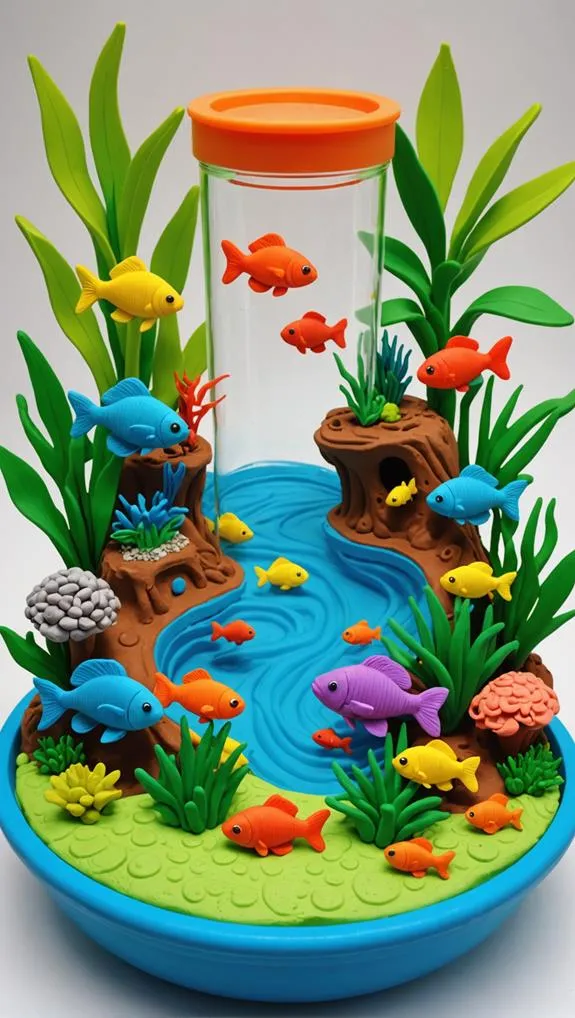
Maintaining your filter is just as important as selecting the right filter media. Filters are essential for keeping your freshwater tank clean and your fish healthy. To ensure optimal flow and efficiency, regular cleaning of the filter media is a must. Depending on your tank size and fish load, set a cleaning schedule that works for you.
Regular filter maintenance can prevent issues like cloudy water causes and ensure a thriving aquatic environment.
When cleaning the tank water, always rinse the filter media in water taken from the aquarium. Using chlorinated or hot water can wipe out beneficial bacteria, which we definitely don't want!
It's also a good idea to monitor water flow rates weekly and check for any debris buildup. This prevents clogs that can hinder filtration performance, much like a traffic jam for your fish.
Don't forget to replace worn or damaged filter media according to the manufacturer's guidelines. Keeping a log of your maintenance activities and scheduling periodic assessments can help track filter performance over time.
This way, you'll know when to make adjustments. Remember, a little effort goes a long way in keeping your aquatic friends happy and healthy!
Installation and Setup Considerations
Setting up your aquarium filter right from the start sets the stage for a healthy tank environment. Proper installation is crucial, so here are three key considerations to keep in mind:
- Filter Placement: Hang-on-Back filters should be near the water surface for optimal flow and aeration. Canister filters need careful hose setup to prevent leaks and maintain efficient suction.
- Follow Instructions: Always read the manufacturer's installation instructions thoroughly. Each filter type has specific requirements that directly impact its performance, so don't skip this step!
- Check Component Fitting: After installation, regularly check that all components fit properly. This helps avoid clogs and inefficiencies, which can stress your fish and compromise water quality.
Noise Levels and Performance
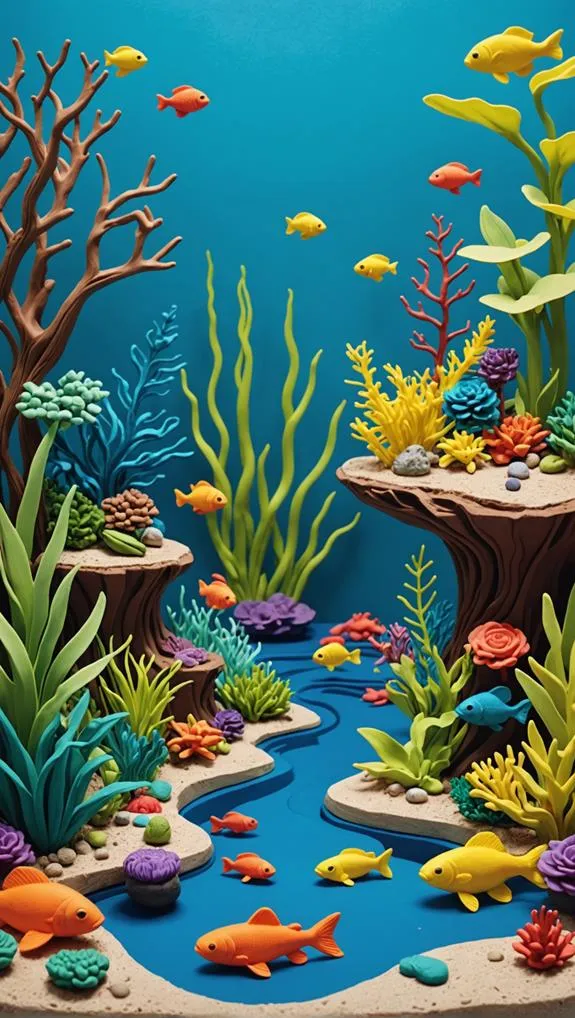
Proper installation not only impacts performance but also plays a significant role in how much noise your filter produces. When you choose a canister filter, you're getting powerful filtration, but that power can come with noticeable noise levels. The design of the pump and how you set it up matters; if it's not placed correctly, you might find it louder than expected.
On the other hand, hang-on-back filters typically offer a quieter experience due to their simpler design. Just keep in mind that adjusting the flow rates can sometimes lead to a bit of extra noise, so finding the sweet spot is key.
If you're looking for peace and quiet, sponge filters are your best friend; they run nearly silently, making them fantastic for breeding setups or sensitive species.
Regular maintenance is essential, too. If your filter starts sounding like a mini waterfall, it might be time to check for clogs or mechanical issues.
And if noise remains a concern, consider repositioning your filter or using sound-dampening materials, just be careful not to block vital water circulation!
Choosing the Right Filter
Selecting the right filter for your freshwater tank is crucial for ensuring a healthy environment for your fish. With so many options, it can feel overwhelming. But don't worry! Here's a quick guide to help you out:
- Assess Your Aquarium Size: Make sure the filter's capacity and flow rate match your tank's size and the types of fish you're keeping.
- Multi-Stage Filtration: Look for filters that provide mechanical, biological, and chemical filtration. This trio keeps the water clean and your fish happy.
- Maintenance Matters: Consider how often you're willing to maintain the filter. Canister filters might need a bit more love, while sponge filters are user-friendly and easier to manage.
When choosing a filter, don't forget to check the variety of filter media available. Research reliable brands and read reviews to find one that suits your needs.
Frequently Asked Questions
What Is the Best Filtration Method for Aquariums?
The best filtration method for aquariums combines mechanical filtration to remove debris, biological filtration for breaking down toxins, and chemical filtration to eliminate impurities. This approach ensures a healthy environment for your fish and plants.
What Is the Best Way to Filter Aquarium Water?
To filter aquarium water effectively, you'll want to combine mechanical filtration, biological filtration, and chemical filtration. This trio ensures you remove debris, promote beneficial bacteria, and detoxify impurities, creating a healthier environment for your aquatic friends.
Which Is the Best Type of Filter for an Aquarium?
When you're choosing a filter, remember that filter efficiency directly impacts water clarity and aquarium maintenance. Opt for a system that balances mechanical and biological filtration, ensuring your aquatic friends thrive in a clean, healthy environment.
What Are the Three Types of Filtration Systems for Aquariums?
You're looking at three types of filtration systems for aquariums: mechanical filtration clears debris, biological filtration supports beneficial bacteria, and chemical filtration removes impurities. Together, they create a healthier environment for aquatic life.
Final Thoughts
Choosing the right filtration system for your freshwater tank is like finding the perfect pair of shoes; they need to fit just right to keep you comfortable! With the right filter, you'll create a happy, healthy environment for your fish. Remember, it's all about balancing efficiency, maintenance, and noise levels. So, take your time, do a little research, and soon you'll be swimming in the joys of a sparkling clean aquarium! Happy fishkeeping!

